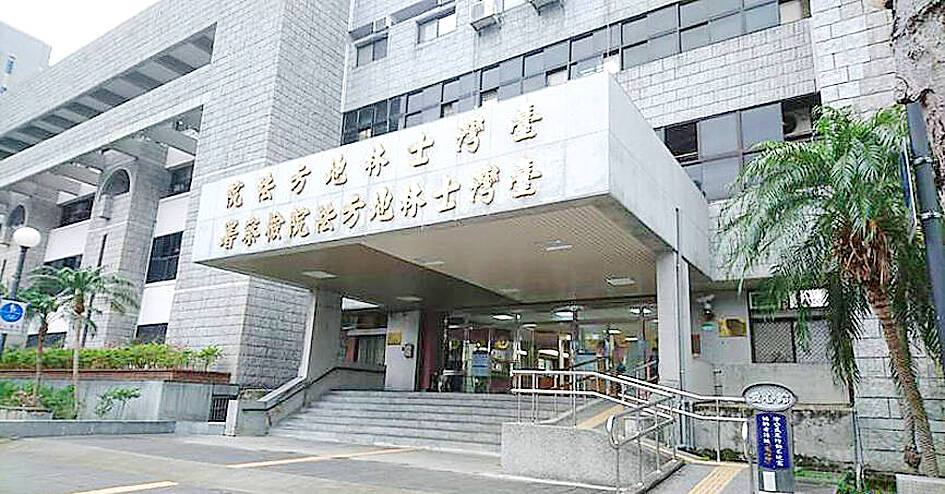The Shilin District Prosecutors’ Office yesterday indicted Taipei City Councilor Chen E-jun (陳怡君) on charges of accepting bribes and misusing public funds.
Chen, a member of the Democratic Progressive Party (DPP), and her assistant Chang Hui-lin (張惠霖) allegedly accepted bribes from Pinchia Construction Co between August 2023 and February, a statement from the prosecutors’ office said.
Pinchia’s representative Hu Wei-liang (胡偉良) and president Kao Ming-yi (高明義) were also indicted for offering bribes in exchange for expediting the issuance of construction permits for a site in Taipei’s Datong District (大同), the statement said.

Photo: Wu Cheng-feng, Taipei Times
Prosecutors said Hu and Kao hired Chang as a company consultant, paying her monthly fees totaling more than NT$700,000 (US$23,329).
In return, Chen and Chang allegedly pressured city government departments involved in permitting and construction reviews to speed up administrative procedures, prosecutors said.
They also used the city councilor’s office as a front to request assistance with tasks such as transplanting street trees, they said.
Kao told investigators that Chang was hired because civil servants tend to be more responsive when a city councilor was involved in monitoring construction progress, prosecutors said, adding that Chang reported to receiving payments from Pinchia and assisting the company with constituent services, as well as relaying urban renewal demands to Kao.
Prosecutors also indicted Chen and Chang for allegedly claiming more than NT$3.84 million in fraudulent assistant salaries. Both have been held incommunicado since February, as the Shilin District Court cited concerns over potential collusion and tampering with evidence.
Three other people — relatives of Chen and Chang — were also indicted for allegedly lending their names to the salary scheme, prosecutors said.
All three told investigators they had never worked as councilor assistants, prosecutors added.
Chen and Chang cooperated with the investigation and have voluntarily returned the full amount of the misappropriated funds, prosecutors said.

The manufacture of the remaining 28 M1A2T Abrams tanks Taiwan purchased from the US has recently been completed, and they are expected to be delivered within the next one to two months, a source said yesterday. The Ministry of National Defense is arranging cargo ships to transport the tanks to Taiwan as soon as possible, said the source, who is familiar with the matter. The estimated arrival time ranges from late this month to early next month, the source said. The 28 Abrams tanks make up the third and final batch of a total of 108 tanks, valued at about NT$40.5 billion

A group from the Taiwanese Designers in Australia association yesterday represented Taiwan at the Midsumma Pride March in Melbourne. The march, held in the St. Kilda suburb, is the city’s largest LGBTQIA+ parade and the flagship event of the annual Midsumma Festival. It attracted more than 45,000 spectators who supported the 400 groups and 10,000 marchers that participated this year, the association said. Taiwanese Designers said they organized a team to march for Taiwan this year, joining politicians, government agencies, professionals and community organizations in showing support for LGBTQIA+ people and diverse communities. As the first country in Asia to legalize same-sex

Travel agencies in Taiwan are working to secure alternative flights for travelers bound for New Zealand for the Lunar New Year holiday, as Air New Zealand workers are set to strike next week. The airline said that it has confirmed that the planned industrial action by its international wide-body cabin crew would go ahead on Thursday and Friday next week. While the Auckland-based carrier pledged to take reasonable measures to mitigate the impact of the workers’ strike, an Air New Zealand flight arriving at Taipei from Auckland on Thursday and another flight departing from Taipei for Auckland on Saturday would have to

MOTIVES QUESTIONED The PLA considers Xi’s policies toward Taiwan to be driven by personal considerations rather than military assessment, the Epoch Times reports Chinese President Xi Jinping’s (習近平) latest purge of the Chinese People’s Liberation Army (PLA) leadership might have been prompted by the military’s opposition to plans of invading Taiwan, the Epoch Times said. The Chinese military opposes waging war against Taiwan by a large consensus, putting it at odds with Xi’s vision, the Falun Gong-affiliated daily said in a report on Thursday, citing anonymous sources with insight into the PLA’s inner workings. The opposition is not the opinion of a few generals, but a widely shared view among the PLA cadre, the Epoch Times cited them as saying. “Chinese forces know full well that